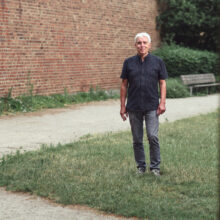
This is how to make parking policy less emotional
It is also sometimes difficult for policymakers not to approach parking from an emotional standpoint. This is partly because of the often violent reactions among residents but also because professional parking management is still uncharted territory.
Parking policy is not a detail but the bottom line
The potential of a thoughtful parking policy is still too often underestimated. It should be at the heart of any sustainable mobility plan. With minimal efforts, policymakers can achieve very large benefits. Simple interventions can already make a city much more liveable and pleasant for cyclists and walkers, but also and especially for the people who live there.
A city must then have the guts to face the emotions. That way, they can turn the initial, often negative, reactions into a positive story that benefits the quality of life in the city for residents and visitors alike.

Cities and towns do not need expensive toolkits or urban planning interventions for healthier and more liveable streets. Parking management is an opportunity that is just there for the taking.
Projectleider Mobiel 21

The benefits of less parking
People still very often consider a cheap or even free parking space right outside their door as an acquired right. However, we are talking about millions of square metres of valuable public space that could be used much more usefully in many places to make the environment more liveable and safer for everyone.
The European Park4SUMP project, launched in the framework of Horizon 2020, and some concrete examples abroad show that less on-street parking can be more profitable than at first sight.
Four benefits of parking management
Accessibility
Fragmenting parking less, concentrating it more and combining it with public transport (Park&Ride) or cycling (Bike&Ride) creates 'mobility hubs' that encourage sustainable travel in a city.
Environment
Effective parking management reduces unnecessary car traffic in a city and thus has a direct impact on air quality. Research shows that up to 30% of traffic in a city is simply looking for a parking space.
Livability
Less unnecessary traffic also means more pleasant streets to walk around. By eliminating parking spaces, there is also more space for wider cycle paths and footpaths. And for meeting and thus mental well-being.
Economy
Pleasant streets can convince more people to shop there, which is positive for local merchants.

These cities already did it
Several cities are already convinced of the power of parking management and have far-reaching plans on the table. Just last year, for instance, Brussels opened a major new P&R and has several more in the pipeline to increase inner-city accessibility. Furthermore, the capital also wants to scrap up to 60,000 on-street parking spaces in the coming years, giving more space to pedestrians, cyclists and public transport.
Scrapping on-street parking spaces is also on the list with the mayor of Paris. That even wants to remove 72% of on-street car parks to build more infrastructure for cyclists. Also closer to home, Sint-Niklaas, a Park4SUMP partner, is leading by example. Among other things, the city transformed Stationsstraat from a classic street with parking spaces into a pleasant shopping-walking street.
What about transport poverty?
Of course, parking policies not only provide great benefits, they also present cities with some challenges that should not be underestimated. Cutting parking spaces can limit the opportunities of some groups, leading to transport poverty.
Mobiel 21 has been working on the topic for several years and has gained a lot of expertise in the meantime. Combined with its experience as project leader of Park4SUMP, this makes Mobiel 21 a reliable partner that supports Flemish cities in their transition to a more sustainable transport model.
Related insights

What makes research by Mobiel 21 so unique?
Mobiel 21 conducts mobility research that translates social signals and policy questions into concrete action points. Cycling behaviour, mobility poverty or support for local mobility measures? Together with citizens, policymakers, companies and all kinds of other organisations, we arrive at new insights. In an accessible and people-oriented way. Discover how we work.

"Our goal? To get all of Lier, inside the vests one day car-free!"
The Mobility Council in Lier works closely with the city to make Car-Free Sunday a blissful day without cars every time, with thousands of pedestrians and trappers and lots of healthy air. And the ambitions are big. How big? We asked Lieve, president of the Mobility Council.

Creating people-friendly streets
Streets should prioritise people over cars. Through creative campaigns, temporary interventions and experiments, we show how cities and towns can reclaim space for walking, cycling and community life.